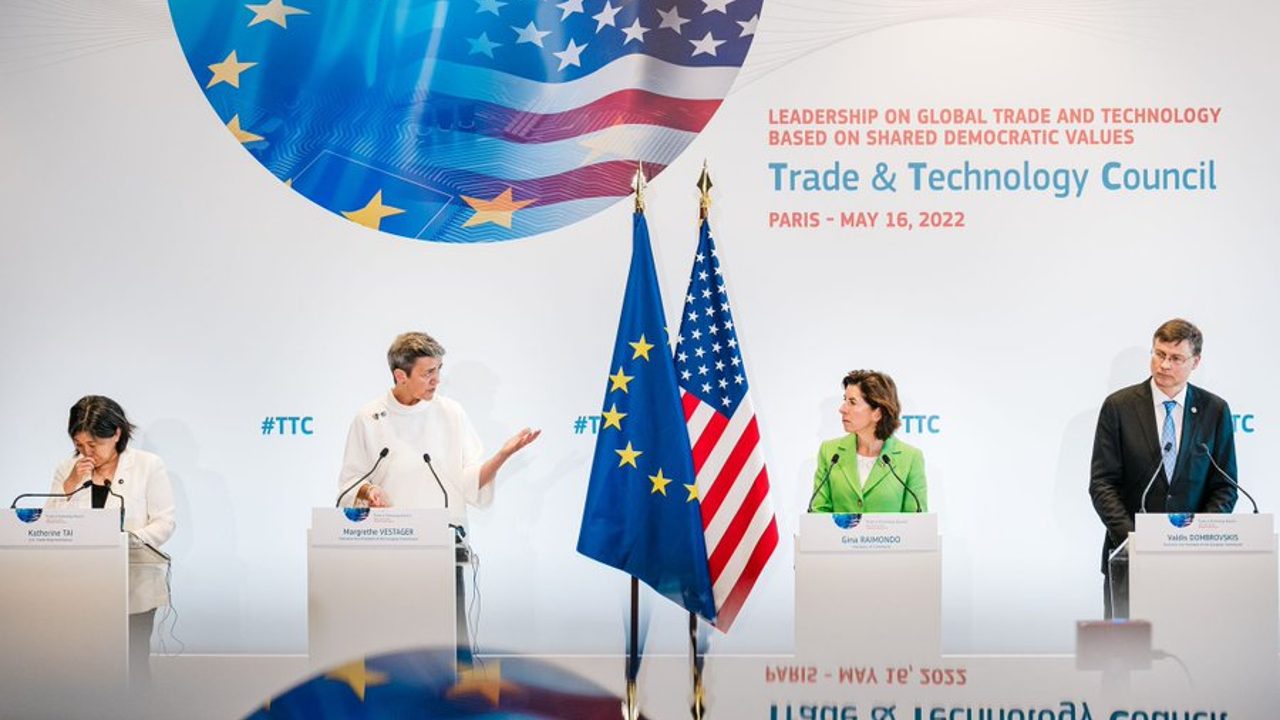The Trade and Technology Council (TTC) consists of ten working groups dealing with issues ranging from export controls to Artificial Intelligence (AI). The groups avoid most contentious issues. They don’t deal with Europe’s crackdown on major US tech companies. They say little explicitly about how to confront China. Instead, they focus on areas where convergence looks possible, particularly in the wake of Russia’s invasion of Ukraine.
Here are the key issues, the TTC’s agenda, and the progress reported so far:
- Standards: China has pushed hard for international bodies to adopt its technology standards. A good example is in telecommunications. In response, the EU and US pledged “to exchange information and explore opportunities for collaboration in 5G and 6G. Given that 6G will be critical global infrastructure, common approaches towards 6G international standards are particularly relevant.” Both sides agreed in May to set up a ‘Strategic Standardization Information mechanism.’
- Climate and Green Tech: Another working group focuses on climate change – in particular, on sharing information and best practices for government spending on environmental projects. But few specifics are offered. In the latest meeting of the Council, both sides pledged to create a common methodology on how to measure a carbon footprint.
- Supply Chain: Russia’s invasion of Ukraine magnified the importance of increasing the resilience of technology supply chains. Russia and Ukraine provide critical components, including palladium and neon, elements important to automaking and chip fabrication. Outside of the TTC, both the EU and the US have announced initiatives to increase self-sufficiency in chip fabrication. Within the TTC working group, both sides have announced their intention to avoid a subsidy race (where each competes to host the most advanced facilities) and to build a new early warning system to detect supply chain vulnerabilities.
- ICT Security: The Solarwinds cyberattack in 2020 illustrated a major growing threat in cybersecurity – vendors and software manufacturers, once compromised by a hacker, could spread malicious code across all of their customers. The TTC has assembled a joint task force to finance high-trust, low-risk technology vendors and agreed to collaborate on identifying future cyber-threats.
- Data Governance and Platforms: This is a divisive issue, mostly overlooked. Europe recently passed two landmark bills, the Digital Markets and Digital Services Acts. Both increase both platform liability and responsibility, particularly on major US tech firms. At the TTC meeting in May, the US and EU sidestepped this potential disagreement. They created a mechanism to alert platforms of illegal content, without offering any details. They also agreed to collaborate on some non-controversial areas, including improved access to data for researchers, new child safety protections, and increased understanding of algorithms.
- Misuse of Technology: The misuse of technology working group aims to combat authoritarian surveillance, censorship, and the spread of disinformation. Russia’s invasion of Ukraine and its descent into digital authoritarianism were the major focus. No concrete results have been announced.
- Export Controls: The invasion of Ukraine brought the US and EU together to impose unprecedented sanctions on Russia. The working group is now leveraging this success to extend export controls on critical technologies to China, coordinate information exchange on dual-use technologies, screen investments, and combine action against high-risk vendors.
- AI: While the US focuses on AI’s ability to innovate, and the EU on managing AI risks, the TTC aims to play an important role in balancing these approaches. Together, the EU and US might be able to agree on safe and responsible AI innovation. If they don’t work together, global fragmentation on this key technology could ensue.
- Development Funding: The EU and US want to help middle-income countries choose Western alternatives to Chinese telecommunications and digital infrastructure. Expect to see at least a couple of these funding projects to be announced by the end of the year.
- Data Flows: A working group on global trade challenges could take up the EU’s “planned controls on transatlantic transfers of non-personal data,” argues Ken Propp, a fellow at the Atlantic Council. “Since the Data Act is at an early stage of legislative consideration, with the European Parliament and the Council just beginning to develop their own positions, early consultation with the United States could help avoid transatlantic conflict of the kind that has persisted for years over personal data transfers.”
It’s an ambitious agenda. The US and EU may still go in different directions in regulating tech – but at least they now have an institution that can help manage these differences – and hopefully, find areas to work together.
Alexander Wirth is a program officer at CEPA’s Digital Innovation Initiative.
Bandwidth is CEPA’s online journal dedicated to advancing transatlantic cooperation on tech policy. All opinions are those of the author and do not necessarily represent the position or views of the institutions they represent or the Center for European Policy Analysis.





